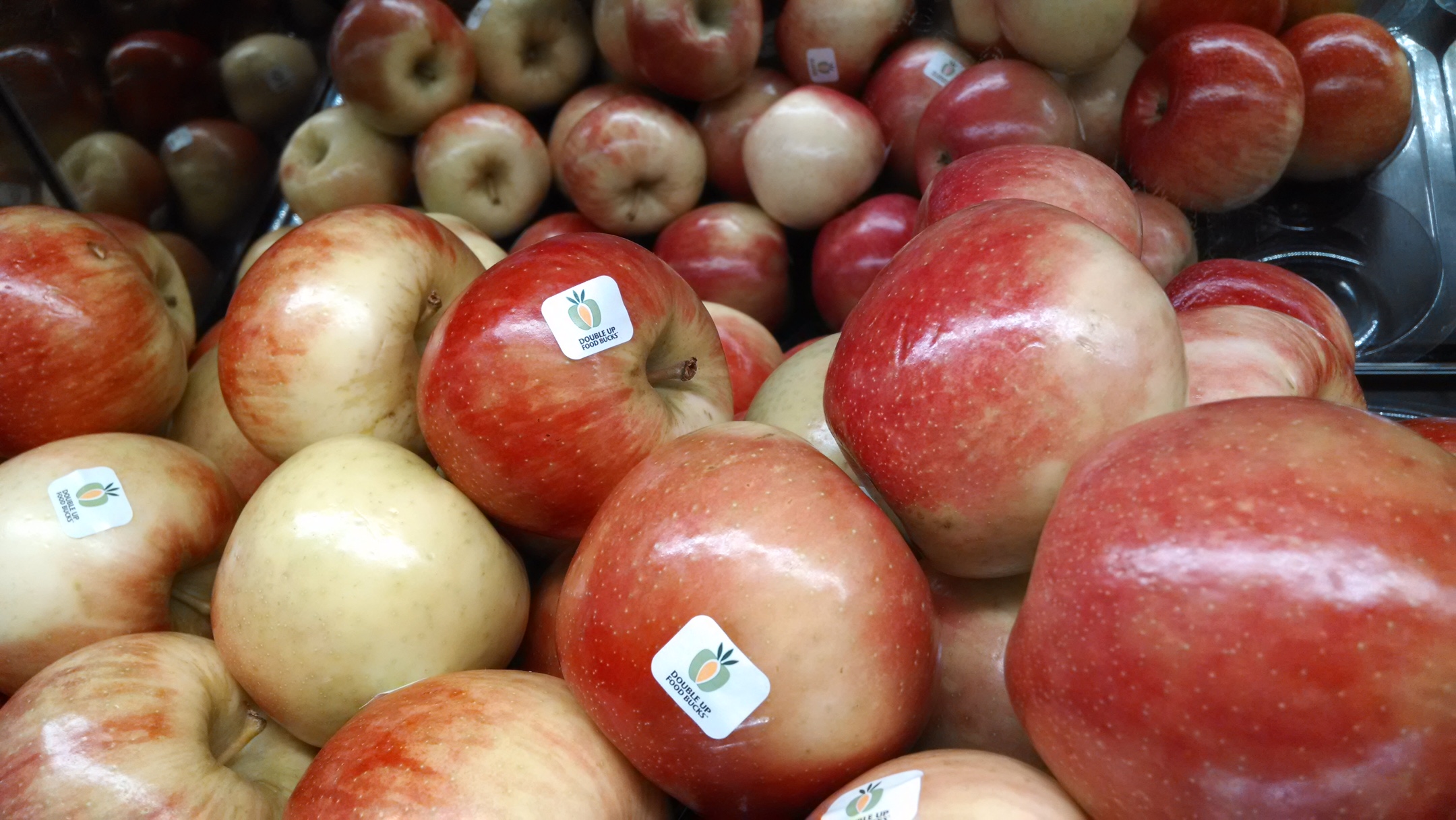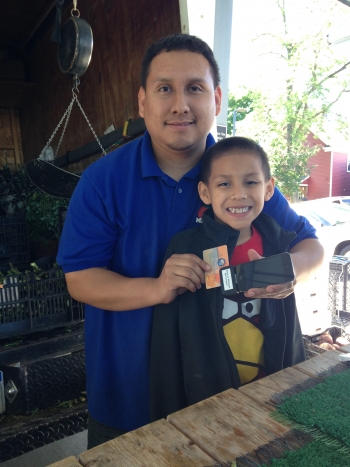USDA Funding Grows Healthy Food Incentive Programming Nationwide
Author: Oran B. Hesterman
Source: Altarum Health Policy Forum
On April 1, 2015, the U.S. Department of Agriculture (USDA) announced $31 million in funding to support healthy food incentive projects in communities nationwide.

These grants are the first provided through the new Food Insecurity Nutrition Incentive (FINI) program, which will support programs that help participants in the Supplemental Nutrition Assistance Program (SNAP, formerly known as Food Stamps) increase their purchase of fruits and vegetables. These funds are just one example of ways in which Congress and USDA are promoting healthier, less processed food.
USDA Secretary Vilsack commented, “Encouraging low-income families to put more healthy food in their grocery baskets is part of USDA’s ongoing commitment to improving the diet and health of all Americans…. These creative community partnerships also benefit regional food producers and local economies along with SNAP participants.”
U.S. Sen. Debbie Stabenow of Michigan championed this new federal investment in healthy food for SNAP families and forged the strong bipartisan commitment that ensured funding was included in last year’s Farm Bill. USDA’s speedy program implementation reflects how seriously the Administration is taking its mandate to improve the well-being of federal nutrition program participants.
We at Fair Food Network are proud to announce that we received $5.1 million in funding to expand Double Up Food Bucks, Michigan’s statewide healthy produce incentive program that simultaneously increases access to healthy food for low-income Americans and puts more money in the pockets of family farmers. The USDA grant will be matched with private funds for a total of nearly $10.4 million, an incredible infusion of support to scale up this successful program.
Double Up’s proven model: Innovate, evaluate, replicate
Double Up Food Bucks matches the value of SNAP purchases made at participating sites with additional dollars to spend on fresh, regionally grown produce. For instance, a family that spends $10 in SNAP benefits at a participating farmers market or grocery store receives an additional $10 in Double Up Food Bucks to purchase Michigan grown fruits and vegetables.
Watch how it works.
The positive impacts are threefold: Low-income families have increased access to healthy food and eat more of it, regional farmers gain new customers and make more money, and more food dollars stay in the local economy.
Since 2009, Double Up has expanded from five farmers markets in Detroit to more than 150 sites across Michigan, benefitting more than 300,000 low-income families and more than 1,000 farmers. You can read more of our exciting results in a study of Double Up’s first 5 years. Michigan is now number three in the nation for SNAP use at farmers markets and the top state in the Midwest Region; we firmly believe that Double Up has played a strong role in those statistics!
New Frontiers
Expansion in Farmers Markets
The grant for Double Up Food Bucks will expand the program in Michigan, reaching 215 communities by 2019—at least 100 more sites than are currently being served. This means that approximately 260,000 additional low-income residents will gain increased access to fresh, affordable produce, representing a full 30% of SNAP households in Michigan.
In addition to growing the program’s presence at farmers markets, Fair Food Network will use the combined $10 million to support further innovations in this already effective model:
From Farmers Markets to Grocery Stores
Grocery stores are the next frontier for healthy food incentives and a crucial setting for reaching a more diverse range of SNAP participants.
Since the program’s inception, annual SNAP and Double Up sales spent with Michigan farmers have grown from a mere $31,000 to more than $1.7 million.[1] Although this represents an exponential increase in SNAP sales, it is less than 1% of the $2.9 billion in purchases made with SNAP benefits in the state in 2013.[2]

That is why it is so critical to bring Double Up to new retail settings. With this new funding, we will grow our Double Up Grocery Project to up to 50 grocery locations by 2018.
Fair Food Network anticipates that this work will result in 360,000 purchases and $5.7 million in SNAP and incentive fund expenditures for healthy fruits and vegetables at 50 outlets by the end of the 4-year grant period. The Double Up incentives will still be used for Michigan grown fruits and vegetables, retaining the program’s positive impact on the state’s farm community and local economies.
From Tokens to Technology
Another area of innovation is expanding new ways of offering incentives. In most locations, incentives are still handed out in the form of physical tokens. Shifting from tokens to electronic and mobile payment methods has multiple benefits, including reducing administrative burden on market staff and eliminating the stigma associated with tokens while lowering the possibilities for misuse and loss. This is a crucial area for innovation to support the successful scaling of healthy food incentives.

This has been an area of exploration for Fair Food Network since 2011, working first with the Flint Farmers’ Market and then with markets throughout Kent County in collaboration with the Michigan Department of Community Health’s WIC EBT pilot. The Flint system was the first in the country to offer a food assistance incentive program electronically—a groundbreaking development.
With this new funding support, Fair Food Network will build on its current mobile payment pilot in Kent County and expand the network of farmers markets that use this system up to 50 by 2018.
From Seasonal to Year-Round
In Michigan, more than 30% of residents are obese—the second highest rate of obesity in the Midwest ,[3] one that costs the state $3 billion annually in related medical costs.[4] A balanced diet is crucial for a healthy population, and Double Up is effectively stimulating increased consumption of fresh, nutritious fruits and vegetables.
The third arena for innovation in the program is testing year-round incentive programming. Currently, Double Up is a seasonal effort that runs from June through the end of October at farmers markets and from August through November at participating grocery stores. Extending the program year round will support stronger healthy food environments, building individual and community health.
FINI funding will support a year-round pilot at up to 40 farmers markets and five grocery locations to better serve SNAP customers with affordable, healthy food options all year long.
Grounded in Partnerships
Double Up’s past and continued success is grounded in partnerships. From local markets to leading public, private, and nonprofit organizations across Michigan, Fair Food Network’s FINI plan relies on the strong support and enthusiasm of a diverse network of partners, including philanthropic organizations, nonprofits, state departments and agencies, community-based citizen organizations, and food industry professional organizations, and ranging from AARP Foundation to the Detroit Lions NFL Team.
Fair Food Network is deeply grateful to the more than 50 funders that have supported Double Up through the years. Their support has built a strong foundation for this work and provided the sustainability that encourages long-term planning and community participation.
Through the FINI grant, community partnerships and SNAP participant involvement will be further strengthened in the coming years through a new ambassador strategy that will engage Double Up users to inform program development, communications, operations, and evaluation.
Onward: The Work Continues
The next few years present an exciting opportunity to grow Fair Food Network’s impact in Michigan and to work with other states that can benefit from a unique, proven, and replicable model.
It is also a crucial time to continue building the evidence base around incentives. The comprehensive evaluation planned for this 4-year expansion will build on previous evaluations, which include analyses of the program’s process for and impact on SNAP participants, farmers, and farmers market operators.
Upcoming evaluations will look specifically at the purchasing patterns of shoppers during and beyond their use of Double Up and the impact of the mobile payment processing technology. These evaluations will help us build a compelling case for policymakers that FINI should be included in the next Farm Bill.
Fair Food Network looks forward to working with the public health community to fully understand the impact on SNAP participants’ shopping patterns and experience, dietary behavior, and improved food environments and culture. In the meantime, let us celebrate this important news for low-income consumers, for American farmers, and for the food system field!
[1] Fair Food Network. (2014). Double Up Food Bucks: A five-year success story. Retrieved from http://www.fairfoodnetwork.org/sites/default/files/FFN_DoubleUpFoodBucks_5YearReport.pdf.
[2] Food and Nutrition Service Supplemental Nutrition Assistance Program, Program Accountability and Administration Division. (2014, June). Supplemental Nutrition Assistance Program state activity report: Fiscal year 2013. Retrieved from http://www.fns.usda.gov/sites/default/files/snap/2013-state-activity.pdf.
[3] Robert Wood Johnson Foundation and Trust for America’s Health. (2014, September). The state of obesity: Better policies for a healthier America. Retrieved from http://stateofobesity.org/files/stateofobesity2014.pdf.
[4] Snyder, R. (2011, September 14). A special message from Governor Rick Snyder: Health and wellness. Retrieved from http://www.michigan.gov/snyder/0,4668,7-277-61409_61412_61526-262254–,00.html.
First posted on Altarum Health Policy Forum on April 7, 2015.








